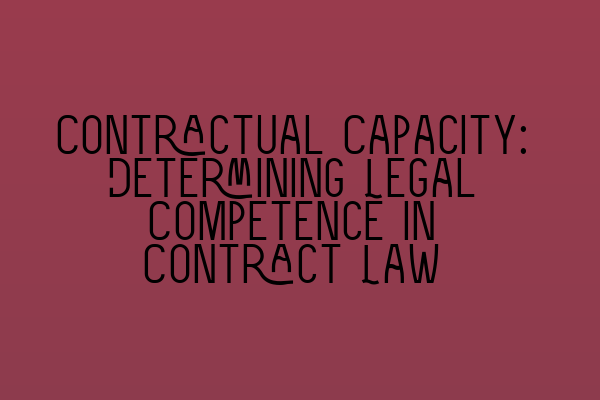Contractual Capacity: Determining Legal Competence in Contract Law
When entering into a contract, it is essential to ensure that all parties involved have the necessary legal capacity to understand and be bound by the terms of the agreement. Contractual capacity refers to a person’s ability to enter into a legally enforceable contract. In this blog post, we will explore the concept of contractual capacity in contract law and discuss the factors that determine legal competence.
The Importance of Contractual Capacity
Contractual capacity is crucial to maintain the integrity and fairness of contract law. It ensures that individuals who lack the necessary mental capacity, age, or knowledge are protected from potential exploitation and unfair agreements. Understanding contractual capacity is essential to determine the validity and enforceability of a contract.
Legal Competence: Factors to Consider
Various factors come into play when assessing an individual’s contractual capacity. These factors can vary depending on the jurisdiction, but the following elements are commonly considered:
Age
Age is a critical factor when determining contractual capacity. In most jurisdictions, minors (individuals below a certain age, usually 18) lack the legal capacity to enter into contracts. Minors are considered vulnerable and may be easily manipulated or coerced. However, there are exceptions to this general rule. For example, contracts for necessities such as food, shelter, and education are enforceable against minors.
For more information on the specific legal requirements for age-related contractual capacity, check out this article: SQE 1 Practice Exam Questions
Mental Capacity
Mental capacity refers to an individual’s ability to understand the nature and consequences of a contract. If a person lacks the mental capacity to comprehend the terms of an agreement, they may not have the necessary contractual capacity. Mental illnesses, intellectual disabilities, and intoxication are factors that can affect an individual’s mental capacity.
For more information on mental capacity and its impact on contractual obligations, make sure to read this article: SQE 1 Practice Mocks FLK1 FLK2
Knowledge and Understanding
Contractual capacity requires a certain level of knowledge and understanding of the terms and consequences of the contract. If a person lacks the necessary knowledge or comprehension, their capacity to enter into a legally enforceable agreement may be called into question. This factor is particularly crucial when dealing with complex or specialized contracts.
To enhance your knowledge and understanding of contract law, consider exploring our SQE 2 preparation courses: SQE 2 Preparation Courses
Presumption of Capacity
In contract law, there is a general presumption that individuals have the necessary contractual capacity unless proven otherwise. This presumption shifts the burden of proof onto the party seeking to invalidate the contract on the grounds of lack of capacity. However, if evidence suggests that one of the parties lacked the required competence at the time of contract formation, the presumption may be overturned, rendering the agreement unenforceable.
Legal Consequences
If it is determined that one or more parties lack the necessary contractual capacity at the time of contract formation, the legal consequences can vary. Common outcomes include:
- The contract being voidable, allowing the party lacking capacity to void or affirm the contract at their discretion.
- The contract being void ab initio, meaning it is treated as if it never existed, and the parties are released from their obligations.
- The contract being enforceable against the party lacking capacity if certain exceptions or protections apply under the law.
To stay up to date with the latest SRA SQE exam dates and requirements, visit: SRA SQE Exam Dates
Conclusion
In contract law, contractual capacity is fundamental to ensuring fairness, protecting vulnerable individuals, and upholding the integrity of agreements. Age, mental capacity, and knowledge play critical roles in determining an individual’s legal competence. Understanding the factors that determine contractual capacity is essential for both solicitors and individuals entering into contracts to ensure compliance with the law and protect their interests.
